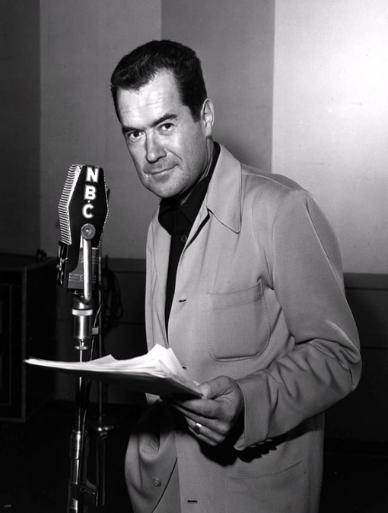Stories Start in Many Different Ways
Feb 6, 2019
“Hi - this is Randy Stone. I cover the night beat for the Chicago Star.”

On February 6, 1950, reporter Randy Stone took his first walk on the Night Beat. Frank Lovejoy starred as Randy, an intrepid newspaperman working at the Chicago Star. Every night, Randy explored the darkened streets of the Windy City in search of stories for his column. Randy Stone was looking for the good and the bad of human nature - anything that would make for a good yarn to follow his byline. Along the way, he usually found trouble among the desperate and the dangerous residents of the city at night.
In each episode of the show, columnist Randy Stone went to work when the sun went down and set off through the city streets in search of stories about people that had fallen through the cracks. The “human” in human interest stories was of paramount importance to him, and like a knight on a romantic crusade, Stone did his best to help the subjects of his stories and ensure as much of a happy ending as he could for his column. Randy Stone wasn’t a detective; he wasn’t even an amateur sleuth like Box 13’s Dan Holiday or Casey, Crime Photographer. But he walked the streets of Chicago after dark and as a sucker for a hard luck story, he frequently found himself in conflict with the mob, gamblers and thieves, con men, and killers. He could be taken in by a sob story or come around to discover a perceived villain had been wronged as badly as the victim. He didn’t carry a gun, and he wasn’t a fighter, but he had dogged persistence in chasing down a story to the end. It was the kind of persistence that was finely honed from walking the streets and wearing out who knows how many pairs of shoes.
On May 19, 1949, an audition program for the series was recorded starring Edmond O’Brien as reporter “Hank Mitchell.” Directed by Bill Rousseau (director of hard-boiled private eye shows Pat Novak and Michael Shayne), O’Brien’s performance was closer to how he’d sound as Johnny Dollar a year later: tougher, cynical, and harder-edged. Not a bad performance (in fact, it served him well in the role of “America’s fabulous freelance insurance investigator”), but it was a little too tough for what producers were looking for. Night Beat got a second bite at the apple almost a year later. This time, actor Frank Lovejoy stepped to the microphone as the lead character, rechristened “Randy Stone.” Where Hank Mitchell was cynical, Randy Stone was a kind of cock-eyed optimist. Where Mitchell was tough, Stone was compassionate. Of the voices, Randy Stone’s sounded more like that of a champion for the little guy. And delivering that winning performance for over 100 episodes was Frank Lovejoy.
Lovejoy had been a radio actor in the 1930s and early 1940s, appearing on Gangbusters and This is Your FBI. He was the first actor to play the Blue Beetle on radio, and he was frequently heard as a supporting player on Sam Spade, Box 13, and Adventures of Superman; he also took more than a few starring turns on Suspense. In films, Lovejoy was often a supporting player in everyman roles in films like The Hitch-Hiker, House of Wax, and In a Lonely Place. This “man of the people” streak to his work served him well as Randy Stone, and Lovejoy delivers one of the best dramatic lead performances from the Golden Age of Radio in Night Beat. It helped that he was given wonderful words to say and characters to say them to with scripts by Larry Marcus, Russell Hughes (main writer for Box 13), and others.
One of the great dramatic shows of the 1950s, Night Beat was anchored by Frank Lovejoy’s performance and strong scripts. Though not strictly a detective program, Night Beat often featured stories of crime and killers, of cops and robbers. Night Beat was a bright spot in the Golden Age of Radio as it gradually gave way to the rise of television.


